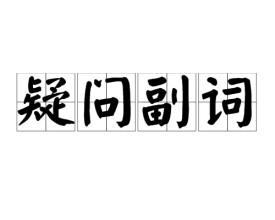疑問副詞
用於引導特殊疑問句的英語語法
when,where,how,why等引導特殊疑問句的詞語。
疑問副詞用來引導特殊疑問句,表示時間,地點,方式,原因等,常見的有:when,where,how,why等。
How are you getting on with your English study?
你的英語學習進展得怎樣?
註:疑問副詞可以與一些詞結合在一起引導特殊疑問句,常見的有:how old,how long,how soon,how often,how far等。如:
How often do you see a movie ?
你多久看一次電影?
How soon will your father come back?
你父親還要多久才回來?
二.副詞的作用
1.副詞一般 可以修飾動詞,形容詞,其他副詞,介詞短語和句子等。如:
There is the post office,right in front of you.
那裡有郵電局,就在你前面。
2.副詞可以修飾名詞或代詞,置於名詞或代詞之後做定語。如:
More and more universities abroad come toenrolnew students in China.
越來越多的外國大學到中國來招生。
3.副詞有時在句中可作表語。如:
I must be off now.
我得走了。
What’s on at the cinema this week?
這星期電影院放映什麼電影?
4.副詞還可在句中作賓語補足語。如:
Let us in,will you?
讓我們進去,好嗎?
When we went to her house,we found her out.
當我們到她家時,發現她不在家。
副詞可以根據它們的意思分為下面幾類:
(1)表示某時間的副詞:
now,then,yesterday,today,tomorrow,tonight,lately,ago,before,just now,so far等。
(2)表示頻率的副詞(可稱為頻率副詞)
always,often,usually,sometimes,frequently,constantly,continually
(3)其他時間副詞:
already,yet,late,early,soon,long,since,at once,(at)first,(at)last,finally,presently,shortly,immediately,right away等。
(1)表示地點的副詞:
here,there,home,upstairs,downstairs,anywhere,everywhere,nowhere,somewhere,abroad,elsewhere等。
(2)表示位置關係的副詞(這些多和介詞同形):
above,over,below,down,up,out,in,across,back,along,round,around,away,near,off,on,inside,outside,past等
多數是形容詞加上ly構成的,和一些well,fast,quick,slow,hard,alone,straight,wide…
在加詞尾ly時要注意:
(1)輔音+le:simple→simply,gentle→gently,
(2)以ic結尾的詞:classic→classical但是public→publicly
(3)以輔音讀音是[i]的y結尾的詞:easy→easily
(4)特例:full→fully,whole→wholly,true→truly
構成特殊疑問句。
how,when,where,why
程度副詞一般放在他所修飾的詞前面。
much,enough,quite,hardly,almost,deeply…
這類副詞有相當於並列連詞的therefore,besides,otherwise,however,moreover,furthermore,still,thus,meanwhile等,也有引導名詞性從句或不定式的when,why,where,how等。
用來引導定語從句,在從句中作狀語。
when,where,why
對整個句子進行說明,一般用逗號與主句隔開。
frankly(坦率地說,說真的),generally(一般說來),luckily(幸運地是),first of all(首先)等。
1.多數副詞可以放在動詞後面,如果是及物動詞,一般放在賓語後面。
I got up late this morning.
I remember having seen him somewhere.
2.一些時間副詞通常放在動詞前面,如果句子里有情態動詞或助動詞或動詞to be,就放在這類動詞的後面。
She often comes here.
I could hardly believe it.
She is seldom ill.
3.疑問副詞,連接副詞,關係副詞和一些形容整個句子的副詞通常放在句首.
比如:actually,(un)fortunately,of course,first,at first,secondly,perhaps,probably,certainly,surely…
How did you like the movie we saw yesterday?
First we must call the police.
4.程度副詞一般放在他所修飾的詞前面。
I amterriblysorry for that.
He doesn't quite agree with me.
He ran so fast that he almost fall.
副詞的比較級和最高級:同形容詞用法相同.
1)fairly,quite,rather表示“十分,非常”。fairly語氣最弱,放在不定冠詞之後;quite語氣較強,放在不定冠詞之前;rather語氣最強,可放在不定冠詞前後,也可放在比較級前和too之前。
例如
This is a fairly interesting story.I want to tell it to my friends.
You have made quite a few mistakes in you writing.(quite a few=many)The weather is rather colder today than I have expected.The student was rather too dull.
2)hardly,scarcely表示“幾乎不”,含否定含義。用於句首時,句子用倒裝語序。hardly和scarcely與when連用,表示“一……,就……”,相當於as soon as.
例如
Hardly had I arrived at the station when the train left.
Scarcely had I entered the cinema when the film began.
3)late意思是“晚”,lately意思為“近來”;high表示位置,highly表示程度;most作副詞表示“最……”,mostly表示“主要的”。
例如
The plane flew high in the sky and soon disappeared. My teacher speaks highly of me.Remember not to be late next time.Have you ever heard from him lately?What do you like most?The village is mostly of brick houses.
4)only too only too表示“很,非常”。
例如
I am only too pleased to help you.
① 時間副詞:一般放在句首或句尾,注意,early、late、before、later、yet等一般放在句尾,already、just一般放在動詞的前面。如:We will visit the Great Wall tomorrow.(我們明天要去參觀長城) / They have already been to the UK twice.(他們去過英王國兩次) / Soon the lost boy found his way back home.(不久迷路的孩子找到了回家的路)
②頻度副詞:一般放在be動詞之後或者助動詞與主要動詞之間,但sometimes、often等還可以放在句首或句尾,usually可放在句首,once可放在句尾,twice、three times等一般放在句尾。如:Sometimes I get up early.(我有時起得早)/ The workers usually have lunch at the factory.(工人們通常在廠里吃午飯) / Take this medicine twice a day.(這種葯一天吃兩次)
③ 方式副詞:一般放在行為動之後,suddenly可以放在句首、句尾或動詞之前。如:Old people can hardly walk as quickly as young people.(老年人幾乎不可能走得和年輕人一樣快) / Suddenly he saw a light in the dark cave(山洞).(突然,在黑黢黢的山洞裡,他看見了一絲亮光)
④地點副詞:一般放在句尾,但here、there還可放在句首。如:There you can see thousands of bikes running in all directions(方向).(在那裡,你可以看到成千上萬的自行車朝各個方向流動) / The frightened wolf ran away.(受到驚嚇的狼逃開了)/ He walked out quietly and turned back soon.(他悄悄地走了出去,很快又返回)
⑤ 程度副詞:修飾動詞時,放在動詞之前;修飾形容詞或副詞時,放在形容詞或副詞之前。但注意,enough總是放在被修飾的形容詞或動詞的後面;only位置比較靈活,總是放在被修飾的詞的前面。如:I nearly forgot all about it if he did not tell me again.(如果他不再次告訴我,我幾乎把那事全忘了) / It was so strange that I could hardly believe my ears.(它那麼奇怪一直我都不能相信我的耳朵) / She got to the station early enough to catch the first bus.(她早早地趕到車站趕上了首班車)
⑥ 疑問副詞:用於對句子的狀語進行提問,位置總是在句首。如:When and where were you born?(你何時何地出生?)/ Why did little Edison sit on some eggs?(小愛迪生為什麼要坐在雞蛋上?)/ How do you do?(你好!)
⑦連接副詞:用來引導主語從句、賓語從句和表語從句,在從句中作狀語。How I am going to kill the cat is still a question.(我打算怎樣殺死那隻貓還是個問題)/ That is why everyone is afraid of the tiger.(那就是人人都害怕老虎的原因) / He wondered how he could do it the next day.(他不知道第二天怎樣做那事)
⑧ 關係副詞:用來引導定語從句,在從句中作狀語。如:This is the place where Mr Zhang once lived.(這就是張先生曾經住過的地方)/ Please tell me the way how you have learned English so well.(請告訴我你的英語是怎樣學得這麼好的方法)
⑨ 其它副詞:too“也”,用在句尾;also放在動詞前;either “也不”,放在句尾;nor“也不”,放在句首;so“如此,這樣”,放在形容詞、副詞前;on/off“開/關”放在動詞之後;not放在be之後、助動詞之後、不定式或動名詞之前;maybe/perhaps放在句首;certainly放在句首或動詞之前。如:He went to the Palace Museum and I went there,too.(他去了故宮博物院,我也去了) / Maybe your ticket is in your inside pocket.(也許你的票就在你的裡邊衣袋裡) / --Tom doesn’t have a computer. –Nor do I.(湯姆沒有計算機,我也沒有。)
地點副詞一般可以作表語,放在be等連繫動詞之後,說明人物所處的位置。如:I’m very sorry he isn’t in at the moment.(很抱歉,他此刻不在家)/ I have been away from my hometown for nearly 20 years.(我離開家鄉有將近20年了) / Jim is over there.(吉姆就在那邊)
時間副詞(如now、then)以及許多地點副詞都可以作名詞的定語,放在名詞的後面。如:People now often have their festival dinners at restaurants.(現在的人們經常在餐館里吃節日晚宴) / Women there were living a terrible life in the 1920s.(在二十世紀20年代那兒的女人過著可怕的日子)
作賓語補足語
地點副詞一般可以作賓語補足語。如:Put your dirty socks away,Jim! They are giving out bad smell!(吉姆,把你的臟襪子拿開!它們在散發著臭氣。) / Father kept him in and doing his lessons.(父親把他關在家裡做作業)
[注意] “動詞+副詞”的賓語如果是代詞,則該副詞應該放在代詞之後。如:He wrote down the word.(他寫下了那個詞。)→He wrote it down.(他把它寫了下來。)
